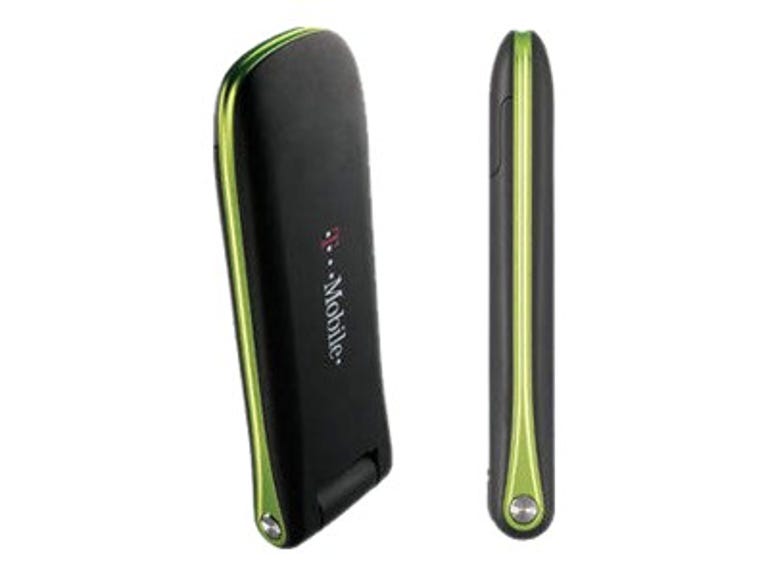 Why You Can Trust CNET
Why You Can Trust CNET T-Mobile WebConnect USB Laptop Stick review: T-Mobile WebConnect USB Laptop Stick
T-Mobile WebConnect USB Laptop Stick
With Wi-Fi hot spots blanketing the nation and its 3G network rolled out and expanding, T-Mobile felt the time was right to roll out its T-Mobile WebConnect USB Laptop Stick. It's the first 3G cellular modem for the carrier, and it lets you connect to the Web on your laptop using T-Mobile's 3G network or Wi-Fi (802.11b/g). The WebConnect worked fine throughout our tests, so our issue isn't with performance, but rather, the pricing.
The Good
The Bad
The Bottom Line
The WebConnect USB Laptop Stick is available now in various pricing options: $49.99 with a two-year contract after rebate; $99.99 with one-year contract; or $249.99 with no contract. On top of that, you'll need a service plan, which starts at $59.99 for 5GB of wireless data per month. If you go over that limit, you will be charged an overage fee of $0.20 per MB. This is on par with the plans offered by other providers that carry broadband devices, such as AT&T and Verizon Wireless. However, T-Mobile's pricing doesn't seem justified when you consider its 3G network reaches fewer people than Verizon and AT&T. Currently, T-Mobile's 3G network is available in 130 cities and covers 100 million people. By comparison, AT&T's 3G network is available in 350 cities, and Verizon covers 274 million people (after the Alltel acquisition). While T-Mobile plans to expand to 100 additional cities by the end of 2009, until then, the WebConnect USB Laptop Stick might be a hard sell unless it lowers the service plan prices.
Manufactured by Huawei Technologies, the WebConnect USB Laptop Stick comes in a nice black-and-neon-green color and measures 3.4 inches tall by 1.1 inches wide by 0.5 inch thick and weighs 1.1 ounces. It features a swivel design, so you can fold it and not have the USB stick protrude from the side of your laptop. However, it's a bit wide, and when plugged into our Lenovo ThinkPad, which has a vertical USB slot, the accessory extended just below the bottom of the laptop and made it a little wobbly on our desk. Not a dealbreaker, just something to note.
There's a small LED on the face of the device that flashes green when it detects signals and turns solid blue when you're connected. The SIM card holder is located on the back, and finally, there's a microSD expansion slot located on the left spine. The latter accepts up to 8GB cards, allowing you to use the WebConnect as a portable storage device. In the box, you get a protective case, a USB cable, and a SIM card.
When we first connected the WebConnect USB Laptop Stick to our laptop, it automatically installed the T-Mobile Connection Manager software, which helps detect the best available Internet connection and tracks your usage. When connected via Broadband mode, you can also use the program to send, receive, forward, and save text messages from your PC. Currently, the device only works with Windows XP and Vista, but T-Mobile said it will add Mac support this summer. Also, the carrier will add more features to WebConnect through over-the-air updates, including A-GPS, but T-Mobile did not reveal a schedule of releases.
The WebConnect offers tri-band 3G connectivity (HSDPA/UMTS 1900/AWS/2100), so you'll be able to use it on compatible networks overseas. T-Mobile's HSDPA network supports download speeds in the range of 600Kbps up to 1Mbps. If you're in an area where there is no 3G coverage, it can work with GPRS/EDGE networks, so you're not left to search out a Wi-Fi hot spot as your only option of getting online.
We tested the WebConnect in San Francisco's SOMA and Marina districts. Based on six tests, we averaged 670Kbps for download speeds and 310Kbps for uploads. The fastest speeds we clocked were 740Kbps for downloads and 323Kbps for uploads. The overall experience was satisfactory, but not great. On T-Mobile's UMTS network and with a signal strength of -77dbm, it took 56 seconds to upload a 1,363KB photo and 15 minutes to download a 60.1MB file from Firefox. CNET's site took 16 seconds to fully load, while The New York Times came up in 26 seconds and CNN in 16 seconds. We'll continue to test the WebConnect in other cities and update the review with results.



